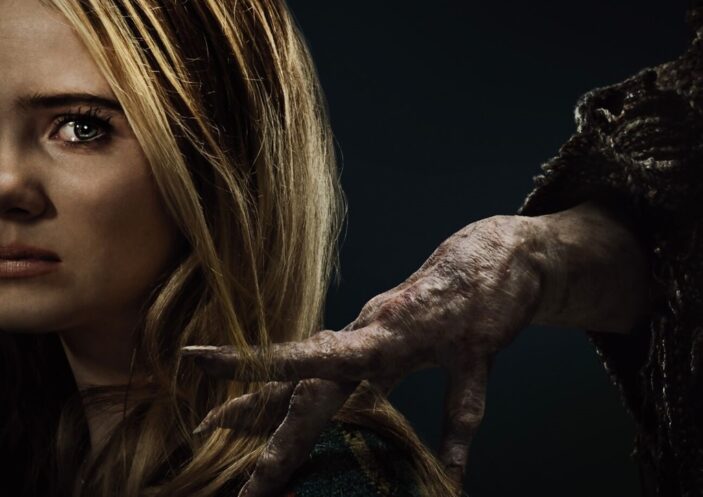
Baghead – and for those deep-cut aficionados, this isn’t connected to the 2008 indie horror flick of the same name that starred Greta Gerwig and was directed by the Duplass brothers – leans into the trusted genre narrative of the boundaries between life and death being somewhat fluid. Arriving several months after the similarly-themed Talk To Me doesn’t help Alberto Corredor‘s contacting-the-dead thriller, but given that this is an expansion of his own 2017 short of the same name, it’s more a case of bad timing, rather than a borrowed narrative.
There’s a specific set of rules at play in Corredor’s universe here, and the orphaned Iris (Freya Allan) is at the centre of it when her estranged father, Owen (Peter Mullan), passes away and leaves her both the bar he owned in Berlin and a video of “instructions” warning Iris that if she is “already dead” if she’s watching the recording. Iris had already projected the narrative that her father was deceased (“Well…he is now”, is her response upon finding out its now official), and though she doesn’t want anything from him, a pub is, at the very least, a great place to find shelter as she navigates her next move.
The instructions Iris receives initially come off as little more than ramblings to her as she has emotionally detached herself from her father, but it soon becomes all too evident that whatever curse Owen believed he was tied to has passed itself onto Iris, as there’s a monstrous woman deep in the depths of the pub – The Queen’s Head – that has the ability to turn her body into a vessel for the dead to temporarily occupy and converse with the living. Her face concealed by a hessian sack gives license to the film’s title, and, given her witch-like nature, any of her supposed goodwill towards the living is manipulated by her own desire to escape the confines of her prison; she and Iris finding an unlikely common ground in such an aspect.
The witch isn’t an entirely unknown entity though, as her ability has caught on to a select few who are willing to pay a hefty price to spend the smallest of moments with a lost loved one. The recently widowed Neil (Jeremy Irvine) is one such soul who wants to connect with his passed wife, and Iris, rather unwillingly, becomes the point of contact between the witch and the customer, abiding by her own set of rules to keep things under control. Customer contact must not exceed 2 minutes (a little more generous than the 90 seconds in Talk To Me), Iris mustn’t utilise the witch for her own gain, and she’s to stay clear of the hole in the basement wall where the witch resides.
As to be expected, rules such as these are broken, and Baghead eventually gives into the more bonkers mentality its story adopts, with Corredor’s tone increasing across the film’s 94 minutes. It initially adopts a slow-burn mentality, with Iris, quite quickly, accepting her new surroundings, before it gives into the exaggerated nature horror often delights in, with certain character actions proving surprising throughout. And though it’s easy to criticise the film for not entirely making the most of its premise, it’s the emotional undercurrent and the film’s feminist gaze that proves its strong point.
The titular, necromantic creation may be demonised, but there’s a heroism to her existence, and her connection to Iris speaks to a patriarchal brotherhood that so often oppresses the female’s voice. Having said that, Baghead certainly isn’t pretending to be a deeper film than advertised, it just helps that what could be seen as a generic genre entrant has a certain layer that may not be necessarily appreciated upon an initial viewing.
![]()
![]()
![]()
![]()
![]()
THREE STARS (OUT OF FIVE)
Baghead is screening in Australian theatres from February 22nd, 2024.
